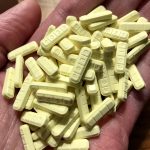What Is The Most Xanax A Doctor Can Prescribe For A Patient?

What is Xanax?
Alprazolam (Xanax) is an antianxiety medication belonging to a class of medications known as benzodiazepines. Xanax works by decreasing abnormal excitement in the brain. The Food and Drug Administration (FDA) approved it in October 1981. Benzodiazepines act on the brain and central nervous system (CNS) to produce a calming effect. Xanax slows down the movement of brain chemicals that may have become unbalanced, resulting in a reduction in nervous tension and anxiety. Xanax works by boosting the effects of a natural chemical called gamma-aminobutyric acid, which is made in the brain.
Xanax is included in Schedule IV of the CSA. Because of this classification, it would seem to indicate that this class of medications has a relatively low potential for abuse in comparison with many other types of controlled substances. This doesn’t mean that it is in any way less dangerous and addictive. Xanax and other Benzodiazepines do have the potential for physical dependence when used for long periods of time and can be psychologically addictive in some individuals.
What is the most Xanax a doctor can prescribe?
Xanax became widely used in anxiety disorders because it provides rapid symptom relief for these disorders (within a week of beginning treatment) and shows no decrease in its effectiveness over time, even when used for several years.
This has resulted in a high number of legal prescriptions for Xanax being issued but this has increased the availability of this drug on the street too. The Drug Enforcement Agency (DEA) has identified “doctor shopping” ( a practice of visiting multiple physicians to obtain multiple prescriptions for otherwise illegal drugs) and prescription forging as major sources of alprazolam on the black market. In 2013, 50 million prescriptions were written for Xanax, an increase from 38 million prescriptions in 2006. Prescription rates for Xanax have been at a steady increase of 9 percent rate since 2008.
Prescription for anxiety disorders in adults typically starts at a dosage of 0.25 mg to 0.5 mg three times per day. Although a doctor may incrementally increase the dosage to maximize the effect, the maximum dosage must not exceed 4 mg per day. For panic disorders, the required dose of Xanax may exceed 4 mg per day.
Safety Warning
Xanax may be habit-forming. Do not take a larger dose, take it more often, or for a longer time than your doctor tells you to. Tell your doctor if you have ever drunk large amounts of alcohol, if you use or have ever used street drugs, or have overused prescription medications. Do not drink alcohol or use street drugs during your treatment. Drinking alcohol or using street drugs during your treatment with alprazolam also increases the risk that you will experience these serious, life-threatening side effects. Also, tell your doctor if you have or have ever had depression or another mental illness.
Xanax may cause a physical dependence (a condition in which unpleasant physical symptoms occur if a medication is suddenly stopped or taken in smaller doses), especially if you take it for several days to several weeks. Do not stop taking this medication or take fewer doses without talking to your doctor. Stopping alprazolam suddenly can worsen your condition and cause withdrawal symptoms that may last for several weeks to more than 12 months.
Doctor shopping for Xanax can pose several dangers to the individual involved and can have broader implications for public health. Some of the potential dangers of Xanax doctor shopping include:
1. Substance Abuse and Addiction: Engaging in doctor shopping to obtain multiple prescriptions for Xanax significantly increases the risk of substance abuse and addiction. Xanax is a potent sedative-hypnotic medication that can lead to physical and psychological dependence when misused or taken in high doses. Doctor shopping allows individuals to obtain larger quantities of the drug, increasing the potential for misuse and addiction.
2. Adverse Health Effects: Taking excessive doses of Xanax or combining it with other substances can result in serious health consequences. Overdose on benzodiazepines like Xanax can cause respiratory depression, drowsiness, confusion, loss of coordination, and, in severe cases, coma or death. Doctor shopping may enable individuals to acquire larger quantities of Xanax, increasing the risk of unintentional overdose.
3. Tolerance and Withdrawal: Prolonged and excessive use of Xanax due to doctor shopping can lead to the development of tolerance, requiring higher doses to achieve the desired effects. When individuals stop using Xanax abruptly or without medical supervision, they may experience withdrawal symptoms, which can be severe and include anxiety, insomnia, irritability, tremors, and seizures.
4. Masking Underlying Issues: Doctor shopping for Xanax may prevent individuals from addressing the underlying causes of their anxiety or other mental health conditions. Rather than seeking appropriate assessment and treatment for their conditions, they rely on the medication to alleviate their symptoms temporarily. This can delay necessary interventions and the development of healthier coping strategies.
5. Legal Consequences: Engaging in doctor shopping is generally illegal and can result in criminal charges and legal consequences. If caught, individuals involved in Xanax doctor shopping may face penalties such as fines, imprisonment, and a criminal record, which can have long-lasting negative impacts on various aspects of their lives.
It’s important for individuals struggling with anxiety or other mental health conditions to seek appropriate medical care, including professional assessment, diagnosis, and treatment. It’s always recommended to work closely with a qualified healthcare professional to develop a comprehensive treatment plan that addresses the underlying issues rather than resorting to doctor shopping or relying solely on medication.





